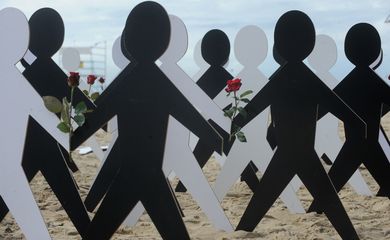Nearly 90% of police killings in 2023 involved black individuals

A study published on Thursday (Nov. 7) by the Network of Security Observatories revealed that 4,025 individuals were killed by police in Brazil in 2023. Race and color data were available for 3,169 of these cases, with 2,782 victims identified as black—representing 87.8 percent of the total.

The data from the fifth edition of the bulletin Pele Alvo: Mortes Que Revelam Um Padrão (Targeted Skin: Deaths that Reveal a Pattern) were obtained through Brazil's Access to Information Law (LAI) in nine states. In all of them, the data show a disturbingly high proportion of black people killed by state intervention: Amazonas (92.6%), Bahia (94.6%), Ceará (88.7%), Maranhão (80%), Pará (91.7%), Pernambuco (95.7%), Piauí (74.1%), Rio de Janeiro (86.9%), and São Paulo (66.3%).
Social scientist and coordinator of the Network, Silvia Ramos, describes the figures as "scandalous," underscoring a deep-rooted issue in the country: racism. While it permeates various sectors such as education, health, and the job market, its most glaring manifestation is in public security.
“The profile of a police suspect is further entrenched within law enforcement. Officers are trained to treat a young white man in a suit in the city differently from a young black man in shorts and flip-flops in a favela. The reality is that 99.9 percent of black youths in favelas and peripheral areas wear shorts and flip-flops, and they are all perceived as dangerous, as potential targets whom the police feel justified in killing if necessary,” says the researcher.
Bahia has the most lethal police force in the country, with 1,702 deaths. This marks the second-highest number recorded since 2019 among all monitored states.
“What we see in Bahia is an escalation. Since the Network began monitoring the state, deaths have increased by 161 percent. From 2019 to 2023, instead of reducing the use of lethal force, it was encouraged. It’s not just that criminals are confronting the police more—there’s a police force whose lethal actions have been unleashed,” explains the social scientist. “When officers kill frequently and receive praise from commanders and institutional incentives, the tendency is for this kind of violent behavior to become increasingly encouraged,” she noted.
The study also emphasizes that young people, particularly those aged 18 to 29, are the most frequent victims of police violence. Ceará stands out as a negative example, where this age group accounts for 69.4 percent of all deaths. Even more concerning is that, across the states analyzed, 243 victims were children and adolescents between the ages of 12 and 17.
Reduction
Some states experienced a reduction in police killings. In Amazonas, there was a 40.4 percent decrease, with a notable shift in the territorial distribution of victims—most deaths now occurring in the state's interior. Maranhão, Piauí, and Rio de Janeiro also saw declines compared to 2022, with reductions of 32.6 percent, 30.8 percent, and 34.5 percent, respectively.
In Ceará and Pará, there were more modest declines in deaths caused by state intervention, with reductions of 3.3 percent and 16 percent, respectively. However, the number of black victims rose sharply in these states—by 27 percent and 13.7 percent, respectively .
Measures
Agência Brasil reached out to some state security secretariats for comments on the study.
The Secretariat of Public Security and Social Defense of Pará (Segup) stated that it has "invested in agent training and technological equipment to legitimize security operations, including the deployment of 1,600 body cameras. Additionally, neuromuscular incapacitation weapons have been acquired for the Military and Civil Police to enable restraint without the risk of serious injury."
According to the secretariat, social inclusion policies have also been introduced, including the establishment of nine "Usinas da Paz," multifunctional state complexes offering free services to promote citizenship and reduce violence. The secretariat credits these initiatives with the 15.89 percent reduction in Deaths by Intervention of State Agents (MIAE) from January to December 2023, compared to the same period in 2022.
The São Paulo State Secretariat for Public Security (SSP-SP) highlighted that “deaths resulting from police intervention occur when suspects resist police action.” The agency asserts that all such cases are thoroughly investigated by the Civil and Military Police, with oversight from correctional offices, the Public Prosecutor's Office, and the Judiciary. It also stated that it “continually invests in personnel training, the acquisition of less-lethal equipment, and the implementation of public policies.”
Ceará's Secretariat of Public Security and Social Defense affirmed its commitment to “reducing stigma and vulnerability faced by black people” and stated that it is collaborating with the Department of Racial Equality to coordinate efforts against discrimination. The department emphasized that public security professionals participate in both initial and ongoing training aimed at delivering humanized care to black people and other vulnerable groups.




